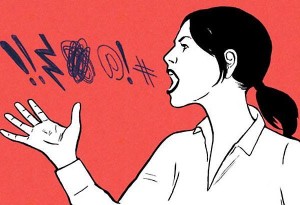Editorial
Glory Reitz
Reporter
Profanities are hurled loosely all the time, but they are hurting everyday communication. They dull the meaning of surrounding words, indicate hostility and discomfit listeners, regardless of how confident and honest they might make cursers feel.
In a normal conversation, curse words lessen the meaning and credibility of speakers. When speakers insert expletives into every sentence, they not only make their meanings difficult to comprehend, but also make themselves hard to view as sincere participants in conversation.
When speakers drop profanities, they are inviting assumptions and judgements about their emotional state of mind. According to Joan Wilson, a Crowder College sociology instructor, cursing is seen as an indicator of an uncontrolled temper.
“Social workers,” said Wilson, “present themselves as an advocate that will stay calm and be a stabilizing force for clients and using bad language may indicate otherwise.”
A common argument for cursing is that profanities are scientifically proven to be good for their utterers: they boost strength and confidence.
I read several articles from this standpoint, among them the NBC’s “When Cursing Is Good for Your Health.” This pro-cursing piece cites several studies and describes the healthy benefits that expletives can offer, but none of the studies are placed in the context of daily conversation.
Maybe curse words can be useful for pain management, boosting energy and relieving stress. But when students are attempting a civilized conversation, curse words won’t do them any favors.
Curse words bring hostility to a conversation. These words are considered profane because they are offensive and hurtful. The intention behind profanities can range from lewd references to vulgar actions to harsh racial discrimination – none of which bring an aura of peace.
Even if frequent use of profanities doesn’t horrifically offend or anger listeners, it often makes them uneasy.
Alexus Russell, general studies major, said that profanities in conversation make her feel awkward and uncomfortable.
“I don’t use those choice words because I have respect for the ones around me, and I want to set a good example for others,” Russell said. “I also feel like those words make a person look less educated. I know that sounds weird, but we go to school to learn new things in English, and all of the other subjects, not to use slang words that are pointless and rude to others.”
If the frequent use of profanities in our culture doesn’t stop, communication will continue to become more unreliable. For the sake of a quality, respectful society, students must put more thought into the meaning behind their words.

Leave a Reply